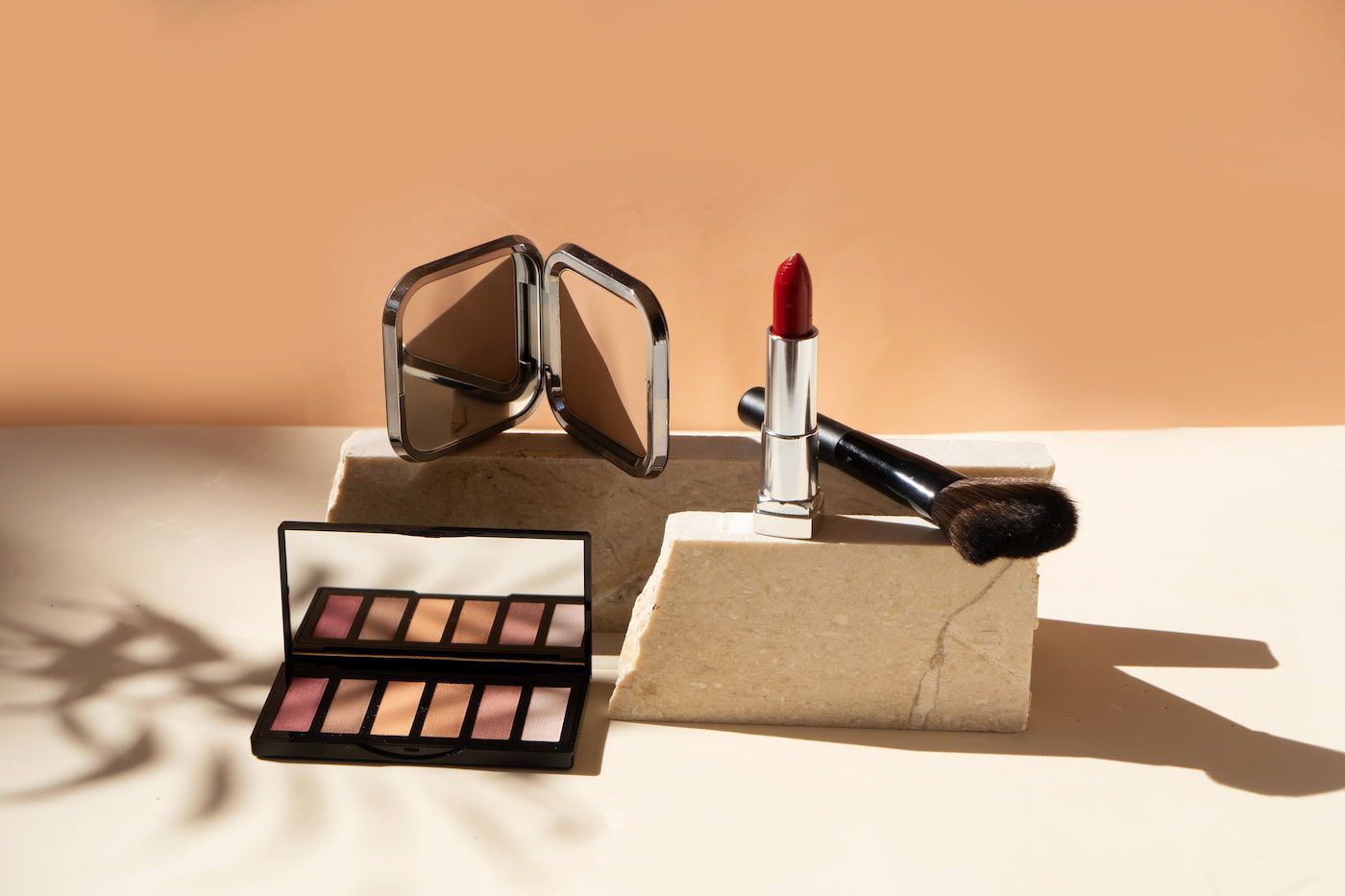How To Start A Makeup Line In 10 Steps

By Stefani Anderson
Updated: Jan 12, 2024

Learning how to start a makeup line is a great way to transform your passion for beauty products into a steady and reliable income stream.
You don't need a background in chemistry or biology. There are excellent online services for you to promote and sell your beauty products to international customers.
In this guide, we'll break down the process of starting a cosmetics line into the essential steps and help you compete with established successful brands.
Reasons To Start A Makeup Line In 2024
A makeup business is one of the best businesses that run themselves, with the potential for consistent passive income. However, making money isn't the only reason people are attracted to selling a makeup line via an online store.
Here are five other popular reasons why setting up a makeup line and entering the cosmetics industry is worth your consideration:
- Capitalizing on a growth industry: The global beauty industry is a robust and growing sector of the economy that continues to thrive with billions of dollars in revenue.
- Enjoying creative freedom: Running your own makeup line is a great way to showcase your creative side and develop new skills and experience.
- Building networks of like-minded people: As your cosmetics business expands, you'll encounter many individuals who share your passions and interests.
- Working on a flexible schedule: As with many other types of solopreneur business ideas, running a makeup brand is something you can work around other activities in your life.
- Using convenient resources: A makeup line can be easily set up with user-friendly e-commerce platforms and manufacturing and distribution services.
Of course, a passion for cosmetics and the beauty industry is another strong reason to consider becoming a budding makeup brand founder.
If it sounds like creating a makeup line is right for you, let's move on to some core considerations before you get started.
Things To Consider
Before you design your makeup line and build brand recognition, there are a few key considerations.
First and foremost, you must be aware of the different types of makeup lines and the target markets for these products.
All-natural makeup is a rising market, with many consumers keen to buy environmentally friendly and sustainable products. Alternatively, if you can access high-end ingredients, consider launching a cosmetics line catering to luxury consumers in boutique outlets. Meanwhile, traditional makeup and accessories are also hugely popular, commonly sold in drugstores and other outlets such as shopping malls.
Whether you're selling drugstore brands or skincare products for the wealthy, you must be clear about what you're hoping to offer.
Of course, you should first develop your budget for manufacturing and marketing strategies to promote your makeup lines to consumers.
How To Start A Makeup Line In 10 Steps (For 2024)
While it may seem daunting when first learning how to start a makeup line, you can follow a few simple steps to do it right.
We've arranged this guide to detail these steps, from doing the necessary market research to branding and promotion for a target market.
Now that we've outlined our approach, here's how to start a makeup line in 10 steps.
Step 1: Research The Beauty Industry
The best small business ideas build their successes on a solid foundation of research, and this is equally true when setting up a makeup line.
As such, the foremost thing you'll need to do when you start a makeup line is to perform extensive research into the cosmetics industry.
Your first port of call should be established and successful beauty brands, analyzing their products and seeing which sell the best. There's plenty of data available breaking down sales for various makeup brands, so check these out and make notes on performance.
You can learn a great deal about the beauty industry by checking out online influencers and bloggers with expertise. For example, many of the best mom blogs will have categories dedicated to makeup products, with in-depth reviews you can read through.
Your research on the beauty industry may help you narrow your specific interests and potentially identify niches or voids in the marketplace that you can fill with your products.
Once you've thoroughly researched the industry landscape, it's time to start defining your personal beauty brand.
Step 2: Create Your Beauty Brand
There are thousands of beauty brands on the market, so it's crucial to establish a presence that distinguishes you from the competition. Determining the nature of your makeup line and the types of products you plan on selling will help you build on your company's brand identity.
This includes designing a logo and other visual branding elements, using striking imagery that captures the essence of your makeup line. If you don't have the necessary skills to do this, you can hire a graphic designer to create content for you.
Check to see how other makeup brands showcase their products and make their cosmetics lines stand out from the crowd.
Likewise, ensure your makeup line's company name is catchy and unique after considering a variety of strong business name ideas to help you choose one that's right for you.
You should check to see how your logos and other brand identity assets work in different formats, both on product packaging and online.
Step 3: Develop Product Concepts
The next important step when creating a successful makeup line is determining the product range you hope to sell to customers.
Start by brainstorming ideas that fit into your brand's voice and assessing the target audience for these products.
You can use many great resources to help you succeed in product development, so make the most of these throughout the process.
Your beauty products will require specific formulas and ingredients, so you'll need to establish contacts that can provide these. If you want to create something unique, this may require access to a chemist specializing in this field.
There are two main types of manufacturers you'll interact with in the cosmetics industry: white label and private label.
As an independent company, a private label manufacturer will give you options to customize your product ingredients to your liking. Choosing a private label company also lets you tailor packaging options to match your brand identity and sell using your name.
Step 4: Fulfil Your Legal Obligations
Before you can start selling your makeup line to customers, there are legal and health-related considerations you'll need to address.
Since starting a makeup line is one of the best international business ideas, it must comply with various legal obligations.
These legal obligations vary from country to country, so it's crucial to be mindful of any restrictions from the outset. It may be a case of restricting your sales to certain territories to minimize the red tape you need to cut through.
The main area in which these legal considerations come into play concerns the ingredients used in your various products.
Speaking to a lawyer is generally advisable, as is checking if your products comply with industry-standard labeling and production. Any claims you make on the packaging must be authentic, backed up by verifiable testing, and in compliance with the relevant protocols.
For example, if you're distributing your makeup line in the United States, you'll need to get the all-clear from the Food and Drug Administration beforehand.
Step 5: Source A Cosmetics Manufacturer
We've touched briefly on the differences between white-label and private-label companies, but it warrants exploring in more detail.
By understanding private labeling details, you will be better equipped to source the best possible manufacturer for your makeup line.
Simply put, a private label manufacturer allows brands to outsource product sourcing and manufacturing to third parties.
As such, when running your makeup line, your sole responsibility will be applying your brand to the packaging when it's time to sell. This makes it a great way to sell makeup online without the necessity for considerable investments in factories and other distribution systems.
Private label production means enjoying higher profit margins while building healthy relationships with loyal consumers.
It also allows you to operate as a wholesaler, providing access to your beauty products to other outlets and establishing a retail price.
By establishing an ongoing relationship with a private label company, your makeup business will retain a degree of exclusivity and appeal.
Step 6: Formulate Your Makeup Line
Once you've established the list of makeup products you wish to sell and your brand values and identity, it's time to formulate your line.
This is where everything kicks into high gear, with the production of your makeup products and initial marketing underway. You should anticipate a heavier workload during this stage and may benefit from bringing others on board to help you manage your tasks.
There are lots of tools and facilities you can turn to, with the best virtual assistant services available to streamline basic tasks and processes. All administrative tasks and paperwork must be finalized during this stage so you can start selling as soon as your products are ready.
This can involve frequent interaction with the beauty lab and checking samples to see if everything is as you intend.
During this process, you should continue referencing similar makeup lines and comparing your products to see if they're up to scratch. This can be as simple as applying your product to your skin alongside your competitors' and comparing the results.
Once the manufacturer has formulated your makeup line, everything should be ready to market and distribute from day one.
Step 7: Set Up An E-commerce Store
While reaching your customers through traditional brick-and-mortar beauty stores is possible, you must be ready to sell online.
This means setting up an e-commerce store that features a variety of payment methods and the ability to manage and track orders. Fortunately, setting up an online store is easier than one might think, and using an e-commerce website builder can save you a lot of hassle.
These platforms let you quickly establish an online store with your branding and upload your inventory in simple steps. Payment processing through VISA, PayPal, and traditional bank transfers is easy to run using an e-commerce platform.
Such platforms provide powerful data analytics and performance tracking tools to help you see which products are performing best. With this information, you can refine your manufacturing processes and weed out products that aren't selling while focusing on your big hitters.
This lets you improve your cosmetics line over time and channel your efforts to create the high-quality products your customers demand. You can also use this information to tailor your social media marketing strategy by optimizing your product listings and SEO.
Step 8: Maximize Social Media
While traditional marketing methods shouldn't be overlooked, many small businesses succeed thanks to their presence on social media.
When creating a cosmetics line, you should develop and foster customer relationships on these platforms. Facebook, Twitter, TikTok, and Instagram are great resources people look to when deciding what products to buy. For example, the best affiliate programs for mom bloggers showcase how a cosmetics brand will partner with influencers to reach their audience.
Platforms like Instagram and TikTok support using paid promotions to reach your target market and drive sales.
You might consider working with established social media pages; for example, the best mom influencers on Instagram reach millions of readers.
You should set up your own social media pages to use in conjunction with other marketing campaigns and build relationships. There are lots of great tools you can use to automate your posts and stick to a consistent schedule when pushing your brand partnerships.
Social media channels provide a practical space to showcase your experience, share makeup tutorials, and bring real value to your audience.
For instance, if you focus on producing cruelty-free products with ethical cosmetics ingredients, put this front and center when posting on social media.
Step 9: Market Your Cosmetics Line
In addition to using social media channels to improve the reach of your cosmetics business, you can also use traditional marketing methods.
The makeup industry typically spends millions of dollars on paid advertising in print magazines and through popular beauty websites.
Before you invest in these marketing strategies, you should be aware of what media your target customers use before they spend money. This will allow you to focus your ad spend on the outlets and online platforms with visitors most likely interested in your products.
When you establish your website, you can use your brand's logo and other assets to quickly build up content from day one. You can integrate your e-commerce store into the site and drive traffic to your products and any promotions you have running.
Additionally, you can start a beauty blog to promote your cosmetics line, along with insightful articles about the beauty industry. Once your website builds up a readership, you can use it to attract influencers to write guest posts that further cement your reputation.
Likewise, videos and podcasts can be incorporated into your beauty blog to add variety and in-depth analysis to your marketing content.
Step 10: Gather Customer Feedback
Once you're up and running, selling your beauty products to consumers, it's time to gather customer feedback. Feedback is crucial for helping you understand what the market demands and how effectively your products work in the real world.
Your e-commerce platform should feature customer reviews, so these can be your first port of call when assessing the performance of specific products.
If you've reached out to people with experience, such as professional makeup artists, their input can be invaluable for future product development. Consider sending out free samples to these and other influencers to get them excited about what you're offering and involved in the process. Beauty influencers will be especially keen to gain early access to a new cosmetics line, giving them a lead over their competitors.
You could sign up for the best Facebook mom groups, post links to your products, and ask for feedback. Just be aware that some Facebook groups have promotion rules, so check with the moderators and ensure you have their permission.
Consider running contests and encouraging makeup lovers to compare your products to those offered by popular makeup brands. The more feedback you gather, the greater your insights into your brand's performance and how you can improve your beauty line for the future.
Summary
Starting your own makeup line is a hugely popular business idea, and this guide has explored the core considerations to be successful.
Whether you plan on selling through retail stores or offering cosmetics products online, it's a solid business plan with great potential.
As your makeup business grows over time, there's lots of scope to target customers with new products that capitalize on the beauty space.
CREATE YOUR OWN WEBSITE
As a mom of three, writing became Stefani’s creative outlet, quickly evolving into a part-time side hustle she could do during nap time. After realizing, she had a knack for writing, Stefani pursued it as a profession and now heads up Friday's content. When she's not wordsmithing for Friday, Stefani enjoys playing at the park with her family, snowboarding, and trying new food.
This blog was created proudly with the Friday Website Builder










